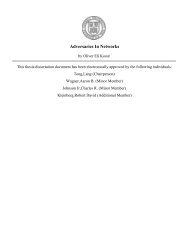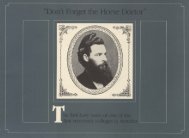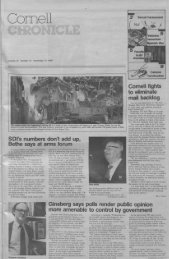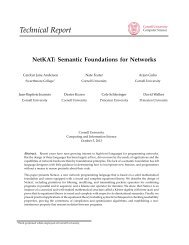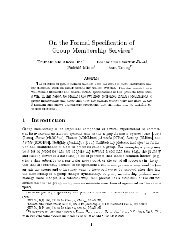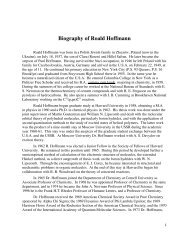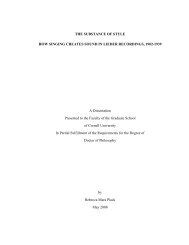Cornell Alumni News - eCommons@Cornell - Cornell University
Cornell Alumni News - eCommons@Cornell - Cornell University
Cornell Alumni News - eCommons@Cornell - Cornell University
You also want an ePaper? Increase the reach of your titles
YUMPU automatically turns print PDFs into web optimized ePapers that Google loves.
guaranteed of this involvement, for example, if he majors<br />
in Asian studies, or Classics, or geological sciences, or<br />
history of art.<br />
Q. Is it then a matter of supply and demand?<br />
A. No. There is more to it than that because in the best<br />
of all possible worlds one would not wish a student to distort<br />
his selection of major simply to get small classes. You<br />
would like a student who wants to major in English to be<br />
able to take small classes. Since so many of our students, not<br />
only in Arts and Sciences, but in other colleges, go on to<br />
graduate work or professional schools, the key thing is that<br />
there should be enough upperclass professors who know a<br />
student well enough to recommend him to graduate school.<br />
If a student's experience has been so impersonal that no<br />
professor knows him well enough to recommend him to<br />
graduate school, I think our educational system is breaking<br />
down.<br />
Q. Did the commission study the constant student complaint<br />
that <strong>Cornell</strong> classes are too large and too anonymous?<br />
A. Yes. There is an elementary idea involved here which<br />
is difficult to get across. Let me try. Suppose I am a <strong>Cornell</strong><br />
professor and I ask myself what my experience is and what<br />
the institution looks like to me. It turns out most of my<br />
class time is spent in small classes because most of the<br />
classes at <strong>Cornell</strong> are small. If I have four classes a year,<br />
the chances are that one will be a large freshman or sophomore<br />
class, but the other three will be small upperclass<br />
courses, or seminars, or graduate seminars. So the professors<br />
'. . . we are certain<br />
that the new dormitory<br />
complex will be very<br />
imaginative and a<br />
highly effective way<br />
of creating a total<br />
educational environment.*<br />
and, if we're not very careful, the administration tend to<br />
think of the institution as a place where there are no class<br />
size problems.<br />
But, let's look at it from the student standpoint. A student<br />
taking these same courses looks at it quite differently because<br />
his chance of being in a course with two hundred<br />
students is twenty times as great as being in a course with<br />
only ten students. If you look at the student experience, you<br />
find that the probability of his being in the large courses is<br />
higher than the probability of his being in a small course,<br />
so, from the student's standpoint, it's just the reverse of the<br />
professor's.<br />
The student thinks of the institution, on the average, as a<br />
place where most of the classes are large. It's a little bit<br />
like the traffic situation in New York City. If you think of<br />
the average over the course of the day on FDR Drive, it's<br />
not jammed up. On the other hand, if you are a commuter<br />
going in the morning and out in the afternoon, you are on<br />
the highway when the jam is heaviest. The reason you're<br />
more likely to be there at that time is exactly the reason the<br />
jam is heaviest. The student is more likely to be in a large<br />
course than in a small one and that's where the problem<br />
arises. Now, this is a very elementary idea which people<br />
presumably have known about for years. Nevertheless, it<br />
is rather intricate which may explain to some extent the<br />
difference in thinking of faculty, who tend to think there is<br />
no class size problem, and students, who tend to think<br />
there is.<br />
Q. Is there a definite correlation in the students 9 minds<br />
between large class and inadequate teaching?<br />
A. I suspect it's an individual thing. There are some very<br />
successful large classes in which the lecturer is a so-called<br />
"star" who spends a great deal of time bringing all of his<br />
experience to bear on making a compact, efficient presentation<br />
of material to students which is followed up in small<br />
recitation or laboratory sections.<br />
On the other hand, there are probably courses involving<br />
only the large lecture which, although good, by no means<br />
takes advantage of the entire experience of the professor in<br />
bringing it to bear on undergraduate teaching problems. I<br />
don't know whether the students, as a whole, correlate large<br />
courses with poor teaching. I hope they do not, because I<br />
don't think there is such a correlation. I think the only<br />
question is that of the appropriate mix of large courses and<br />
small courses over the four years during which a typical<br />
student is at <strong>Cornell</strong>. I think there's no danger in a student<br />
being only involved in small courses while he is here. I<br />
think the only warning flags that are flying, to which we have<br />
to pay some attention, are those telling of the danger of the<br />
student being only involved in large courses.<br />
Q. In terms of student assessment of teaching, there were<br />
some suggestions in the Kahn-Bowers report of students<br />
possibly rating teachers. Has anything been done on this?<br />
A. Well, here's a question where the character of the<br />
commission has turned out to be very sensible. There are<br />
some areas of evaluation which are natural faculty areas.<br />
There are some areas which are natural student areas. It's<br />
possible that the administration has no role at all in this.<br />
What the commission did was to divide a very tangled<br />
problem by separating it into two different solution approaches.<br />
One was the creation of the course evaluation<br />
questionnaire, largely the work of Assistant Professor<br />
James B. Maas of Psychology. This questionnaire was used<br />
by many faculty members at the end of the fall semester<br />
for the purpose of getting "feedback" from students to use<br />
in improving the course. The faculty members need not<br />
show the results of the questionnaire to anybody else and,<br />
in general, probably will not. They simply use it to improve<br />
the course the next time they give it.<br />
The second consideration involves information the students<br />
need in order to select courses. In the fall, Student<br />
Government published the preliminary issue of a document<br />
called Index which gave students descriptive evaluations<br />
of some twenty courses. The students intend to look at fall<br />
term courses in order to bring out a new issue of Index,<br />
presumably for pre-registration time in the spring. This<br />
issue will tackle, I hope, a good deal more than twenty<br />
May 1967 23




